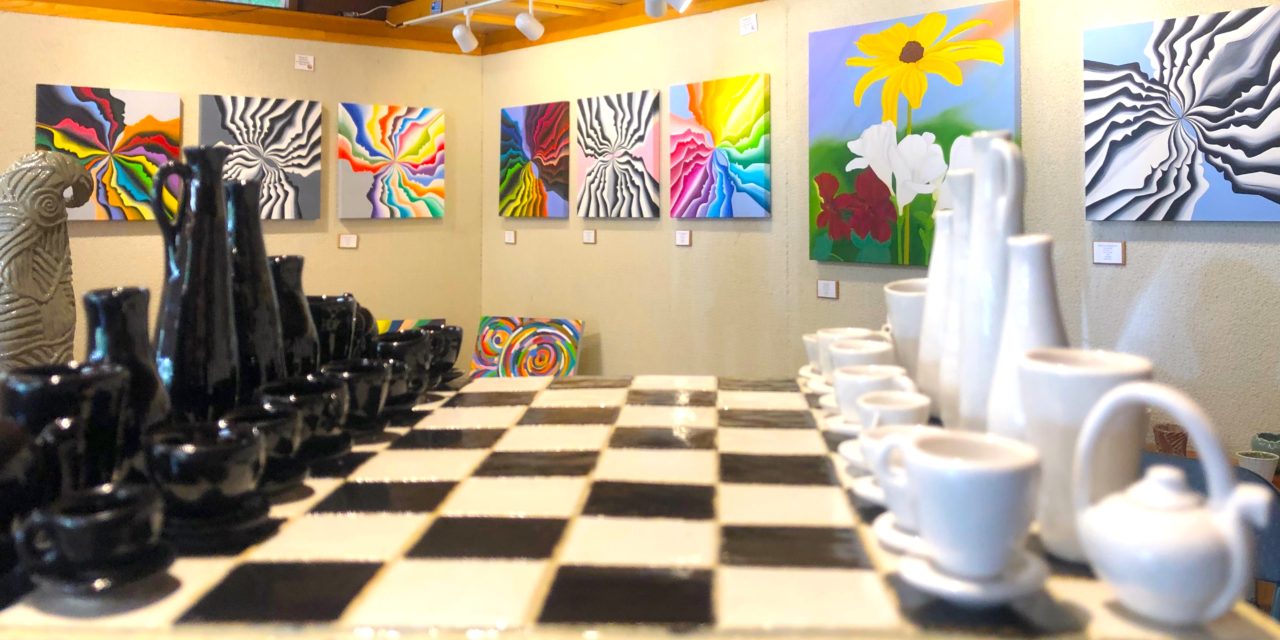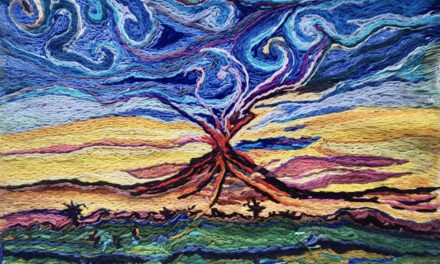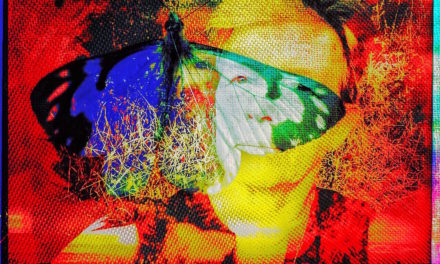(Above: Artist Linda Litteral’s work, which has helped her heal from childhood sexual abuse, includes both paintings and ceramics; photos by Taylor Griggs)
By Taylor Griggs
Linda Litteral doesn’t want people like her to be quiet anymore.
The San Diego-based artist, who specializes in painting and ceramics, has felt the pressure to be quiet and complacent since she was very young.

Artist Linda Litteral
“I’m an incest survivor. When I was a 6-year-old, I didn’t talk,” Litteral said. “Verbalization of trauma is difficult. Sometimes there are no words to express what that trauma feels like, felt like, looks like within your body.”
Litteral’s perspective on art centers on its healing abilities, which she sees through her own experience as well as the experiences of those around her.
“I think that there is something about taking something that we’ve held in our body for a long time and putting it out here and looking at it,” Litteral said. “And if you can make it colorful, make it vibrant, all of the sudden you’re looking at yourself in a totally different way (and at) the trauma that you’re trying to express in a totally different way.”
Litteral began her career in engineering and product design. Art came much later in life, after a move across the country with her husband, who was in the Navy, and difficulties trying to land another engineering job.
“I had my first art class in Charleston, South Carolina, when I was 38,” she said. “My husband had transferred to Charleston from San Diego, and I walked into the engineering department and they said, ‘Oh, we don’t hire women here.’ ”
Frustrated, Litteral had an idea to start her own business making jewelry out of clay, which she never did. Instead, she discovered sculpture and then moved into painting.
Litteral calls her latest show, on display at the Klamath Art Association and Gallery in Klamath Falls, simply Flourish.
“There’s a lot of growing going on within myself, I think,” she said.
Some of the work displayed at the show was done during Litteral’s stint at the Centre Pompadour in France, which she calls a “neofeminist laboratory”.
“My idea, when I applied, was to do an exploration of how men made women have to be feminists throughout history,” she said. “The second day I was there, I woke up and I realized that my body is a repository for that — I’ve lived that. So why not tell my story?”
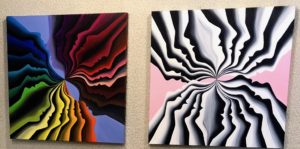
Many of Litteral’s paintings incorporate subtle faces in profile as she explores her feelings and reactions to her own past traumas
Flourish includes a series of self-portraits, which Litteral describes as abstract renditions of herself.
“I really don’t like painting my face. And everyone says, ‘You have to have self-portraits, you’re an artist,’ ” she said. “So this is my series of self-portraits, because I don’t want to paint myself, really. But it is my profile.”
She has experienced meditation and healing through creating the round, mandala-like self-portraits. Litteral believes these self-portraits, which range in color and style, represent how people can react in different situations.
“We’re all made up of different people. We all have different faces, we all have different masks we wear depending on what we’re doing,” she said. “That’s kind of the idea behind the paintings. It’s an exploration of self, an exploration of what a person feels or thinks, through color and shape.”
Litteral’s experience emphasizing healing through art also has called her to teach in prisons, where she shares meaning in the therapeutic nature of the art process, particularly with women who have experienced sexual trauma.
“I teach ‘Expressing Trauma With Line’ to the women, and I designed that class around healing from (my own) traumatic events,” she said, adding that “80 percent of the population there has admitted to some kind of sexual abuse, and that’s something you really have to heal from before you can grow and move on in your life.”
Litteral believes many of the women whom she teaches have ended up in prison as a result of systemic circumstances resulting from sexual abuse.
“That’s probably one of the reasons that they’re in prison, because they were doing such self-destructive behavior because of their abuse,” she said. “I have students who tell me things they don’t tell their therapists — they don’t talk about it,” she said.
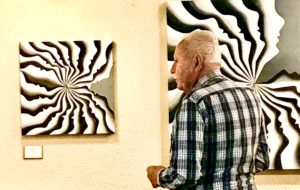
A visitor to the Klamath Art Association and Gallery — appropriately dressed in black-and-white, views Linda Litteral’s work, which helped her heal from childhood sexual abuse; photo by Taylor Griggs
She believes there must be societal change is necessary regarding how people view the issue and respond to the issue of sexual trauma.
“I think it’s something we have to talk about, I think it’s something that should be out in the open, I think it’s something that shouldn’t be hidden in the closet like it has been forever,” Litteral said.
Taking control of a life-ruining experience such as sexual trauma by turning it into art and making it real in a different, life-saving way, is “something transformative,” she said.
Literral knows.
(Taylor Griggs is a recent graduate of the University of Oregon’s School of Journalism and Communications. She is doing an internship with the Klamath Falls Herald and News.)
Flourish
When: Through July 28; artist plans to be in Klamath Falls at the gallery for the last weekend of the show
Where: Klamath Art Association and Gallery, 120 Riverside Drive, Klamath Falls
Gallery hours: Noon to 4 p.m. Thursday through Sunday
Admission: Free
Information: 541-883-1833 or klamathartgallery.blogspot.com
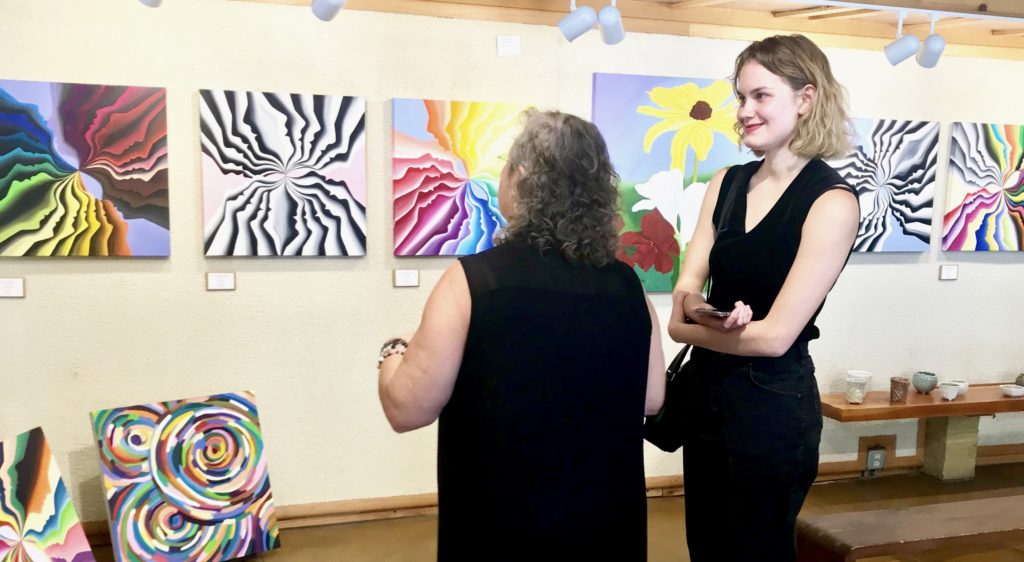
Linda Litteral shows writer Taylor Griggs, right, paintings in her Klamath Falls show that played a part in her personal art therapy; photo by Justina Aura Nemoy

